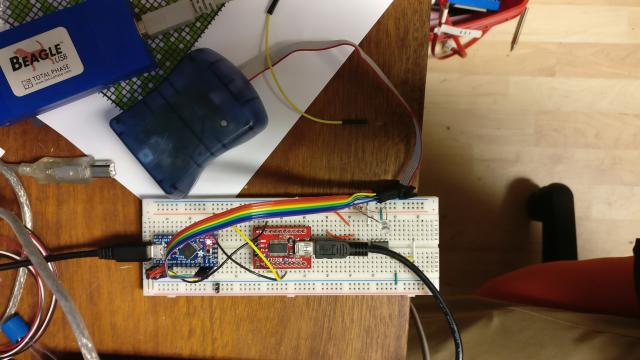ItsyBitsy Snek — snek on the Adafruit ItsyBitsy
I got an ItsyBitsy board from Adafruit a few days ago. This board is about as minimal an Arduino-compatible device as I can imagine. All it's got is an Atmel ATmega 32U4 SoC, one LED, and a few passive components.
I'd done a bit of work with the 32u4 under AltOS a few years ago when Bdale and I built a 'companion' board called TeleScience for TeleMetrum to try and measure rocket airframe temperatures in flight. So, I already had some basic drivers for some of the peripherals, including a USB driver.
USB Adventures
The 32u4 USB hardware is simple, and actually fairly easy to use. The AltOS driver used a separate thread to manage the setup messages on endpoint 0. I didn't imagine I'd have space for threading on this device, so I modified that USB driver to manage setup processing from the interrupt handler. I'd done that on a bunch of other USB parts, so while it took longer than I'd hoped, I did manage to get it working.
Then I spent a whole bunch of time reducing the code size of this driver. It started at about 2kB and is now almost down to 1kB. It's a bit less robust now; hosts sending odd setup messages may get unexpected results.
The last thing I did was to add a FIFO for OUT data. That's because we want to be able to see ^C keystrokes even while Snek is executing code.
Reset as longjmp
On the ATmega 328P, to reset Snek, I just reset the whole chip. Nice and clean. With integrated USB, I can't reset the chip without losing the USB connection, and that would be pretty annoying. Resetting Snek's state back to startup would take a pile of code, so instead, I gathered all of the snek-related .data and .bss variables by changing the linker script. Then, I wrote a reset function that does pretty much what the libc startup code does and then jumps back to main:
snek_poly_t
snek_builtin_reset(void)
{
/* reset data */
memcpy_P(&__snek_data_start__,
(&__text_end__ + (&__snek_data_start__ - &__data_start__)),
&__snek_data_end__ - &__snek_data_start__);
/* reset bss */
memset(&__snek_bss_start__, '\0', &__snek_bss_end__ - &__snek_bss_start__);
/* and off we go! */
longjmp(snek_reset_buf, 1);
return SNEK_NULL;
}
I still need to write code to reset the GPIO pins.
Development Environment
To flash firmware to the device, I stuck the board into a proto board and ran jumpers from my AVRISP cable to the board.
Next, I hooked up a FTDI USB to Serial converter to the 32u4 TX/RX pins. Serial is always easier than USB, and this was certainly the case here.
Finally, I dug out my trusty Beagle USB analyzer. This lets me see every USB packet going between the host and the device and is invaluable for debugging USB issues.
You can see all of these pieces in the picture above. They're sitting on top of a knitting colorwork pattern of snakes and pyramids, which I may have to make something out of.
Current Status
Code for this part is on the master branch, which is available on my home machine as well as github:
I think this is the last major task to finish before I release snek version 1.0. I really wanted to see if I could get snek running on this tiny target. It's nearly there; I want to squeeze a few more things onto this chip.

